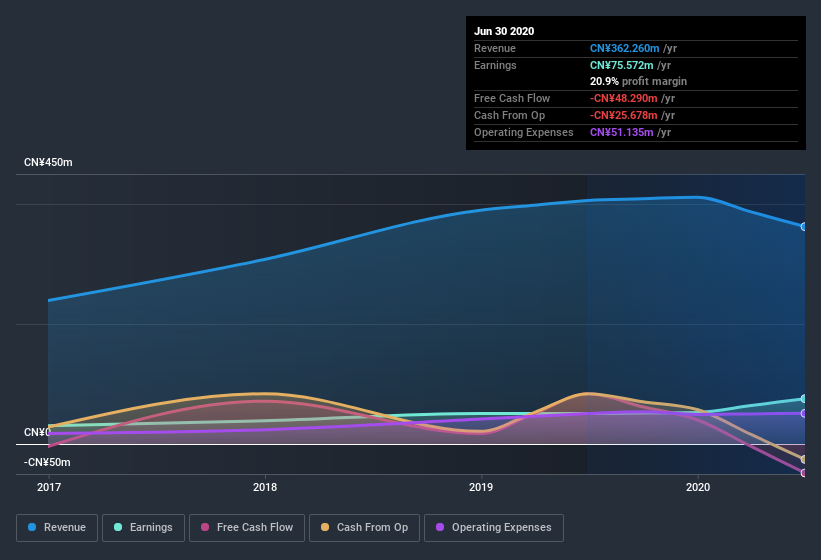- Hong Kong
- /
- Metals and Mining
- /
- SEHK:2346
Universal Star (Holdings) (HKG:2346) Is Growing Earnings But Are They A Good Guide?

Broadly speaking, profitable businesses are less risky than unprofitable ones. Having said that, sometimes statutory profit levels are not a good guide to ongoing profitability, because some short term one-off factor has impacted profit levels. In this article, we'll look at how useful this year's statutory profit is, when analysing Universal Star (Holdings) (HKG:2346).
It's good to see that over the last twelve months Universal Star (Holdings) made a profit of CN¥75.6m on revenue of CN¥362.3m. In the chart below, you can see that its profit and revenue have both grown over the last three years, although its revenue has slipped in the last twelve months.
View our latest analysis for Universal Star (Holdings)

Of course, it is only sensible to look beyond the statutory profits and question how well those numbers represent the sustainable earnings power of the business. As a result, today we're going to take a closer look at Universal Star (Holdings)'s cashflow, and unusual items, with a view to understanding what these might tell us about its statutory profit. Note: we always recommend investors check balance sheet strength. Click here to be taken to our balance sheet analysis of Universal Star (Holdings).
Zooming In On Universal Star (Holdings)'s Earnings
In high finance, the key ratio used to measure how well a company converts reported profits into free cash flow (FCF) is the accrual ratio (from cashflow). To get the accrual ratio we first subtract FCF from profit for a period, and then divide that number by the average operating assets for the period. The ratio shows us how much a company's profit exceeds its FCF.
As a result, a negative accrual ratio is a positive for the company, and a positive accrual ratio is a negative. While having an accrual ratio above zero is of little concern, we do think it's worth noting when a company has a relatively high accrual ratio. Notably, there is some academic evidence that suggests that a high accrual ratio is a bad sign for near-term profits, generally speaking.
Universal Star (Holdings) has an accrual ratio of 0.53 for the year to June 2020. As a general rule, that bodes poorly for future profitability. And indeed, during the period the company didn't produce any free cash flow whatsoever. Over the last year it actually had negative free cash flow of CN¥48m, in contrast to the aforementioned profit of CN¥75.6m. It's worth noting that Universal Star (Holdings) generated positive FCF of CN¥83m a year ago, so at least they've done it in the past. However, that's not all there is to consider. The accrual ratio is reflecting the impact of unusual items on statutory profit, at least in part. One positive for Universal Star (Holdings) shareholders is that it's accrual ratio was significantly better last year, providing reason to believe that it may return to stronger cash conversion in the future. As a result, some shareholders may be looking for stronger cash conversion in the current year.
The Impact Of Unusual Items On Profit
Given the accrual ratio, it's not overly surprising that Universal Star (Holdings)'s profit was boosted by unusual items worth CN¥26m in the last twelve months. While we like to see profit increases, we tend to be a little more cautious when unusual items have made a big contribution. When we analysed the vast majority of listed companies worldwide, we found that significant unusual items are often not repeated. And, after all, that's exactly what the accounting terminology implies. Universal Star (Holdings) had a rather significant contribution from unusual items relative to its profit to June 2020. As a result, we can surmise that the unusual items are making its statutory profit significantly stronger than it would otherwise be.
Our Take On Universal Star (Holdings)'s Profit Performance
Summing up, Universal Star (Holdings) received a nice boost to profit from unusual items, but could not match its paper profit with free cash flow. For all the reasons mentioned above, we think that, at a glance, Universal Star (Holdings)'s statutory profits could be considered to be low quality, because they are likely to give investors an overly positive impression of the company. If you want to do dive deeper into Universal Star (Holdings), you'd also look into what risks it is currently facing. For instance, we've identified 3 warning signs for Universal Star (Holdings) (1 is a bit unpleasant) you should be familiar with.
Our examination of Universal Star (Holdings) has focussed on certain factors that can make its earnings look better than they are. And, on that basis, we are somewhat skeptical. But there is always more to discover if you are capable of focussing your mind on minutiae. Some people consider a high return on equity to be a good sign of a quality business. So you may wish to see this free collection of companies boasting high return on equity, or this list of stocks that insiders are buying.
If you decide to trade Universal Star (Holdings), use the lowest-cost* platform that is rated #1 Overall by Barron’s, Interactive Brokers. Trade stocks, options, futures, forex, bonds and funds on 135 markets, all from a single integrated account. Promoted
New: AI Stock Screener & Alerts
Our new AI Stock Screener scans the market every day to uncover opportunities.
• Dividend Powerhouses (3%+ Yield)
• Undervalued Small Caps with Insider Buying
• High growth Tech and AI Companies
Or build your own from over 50 metrics.
This article by Simply Wall St is general in nature. It does not constitute a recommendation to buy or sell any stock, and does not take account of your objectives, or your financial situation. We aim to bring you long-term focused analysis driven by fundamental data. Note that our analysis may not factor in the latest price-sensitive company announcements or qualitative material. Simply Wall St has no position in any stocks mentioned.
*Interactive Brokers Rated Lowest Cost Broker by StockBrokers.com Annual Online Review 2020
Have feedback on this article? Concerned about the content? Get in touch with us directly. Alternatively, email editorial-team (at) simplywallst.com.
About SEHK:2346
Universal Star (Holdings)
Universal Star (Holdings) Limited designs, develops, produces, and sells sintered NdFeB magnetic materials in the People’s Republic of China and rest of Asia.
Mediocre balance sheet with weak fundamentals.


